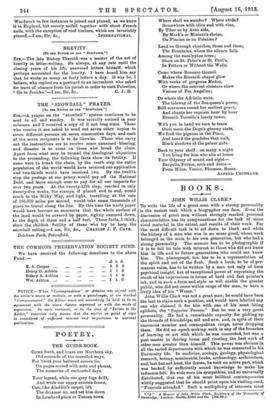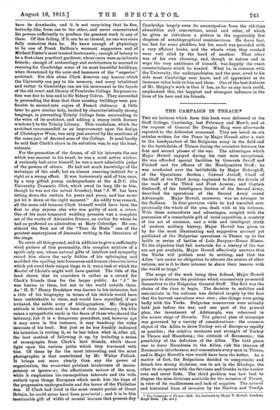BOOKS.
JOHN WILLIS CLARK.* To write the life of a great man with a strong personality is the easiest task which a biographer can face. Even the discussion of great men without strongly marked personal characteristics has its compensations for the lack of more vivid material in the extent and results of their work. Far the most difficult task is to set down in black and white the history of a man who was in no sense great, whose work belonged in the main to his own generation, but who had a strong personality. The memoir has to be photographic if it is to tell its tale with interest to those who did not know him in life and to future generations who could not know him. The photograph, too, has to be a representation of the spirit and not of the flesh. Such a book, to be of per- manent value, has to be written by a man not only of keen psychical insight, but of exceptional power of expressing the result of his impressions in terms of hard and fast printer's ink, and in such a form and style as will enable the greater public, who did not come within range of the man, to have a lively idea of his " Wesen."
John Willis Clark was not a great man; he would have been the last to claim such a position, and would have labelled any one who claimed it for him with one of his most biting epithets, the " Superior Person." But be was a very great personality. He had a remarkable capacity for picking up the threads of friendships, old and new, and, in spite of their enormous number and cosmopolitan range, never dropping them. He did no epoch-making work in any of the branches of learning or art with which he was connected, but was a past master in driving home and riveting the best work of other men greater than himself. This power was obvious in all the varied departments with which he was connected in his University life. In medicine, zoology, geology, physiological research, botany, muniments, books, archaeology, architecture, and, last but not least, the drama, he took an active part, which was backed by sufficiently sound knowledge to make his influence felt. So wide were his sympathies, and so universally distributed, that one of his most brilliant contemporaries wittily suggested that he should print upon his visiting-card, "Funerals attended." Such a multiplicity of interests must
• "J." A Memoir of John Willis Clark, Registrarg of the University of Cambridge. London : Smith, Elder and Co. [10s. 6d.]
have its drawbacks, and it is not surprising that he flew, butterfly-like, from one to the other, and never concentrated his powers sufficiently to produce the greatest work in any of them. Of this failing, if it can be so termed, no one was more fully conscious than he. He knew enough of physiology to be one of Frank Balfour's warmest supporters and of Michael Foster's most trusted lieutenants ; enough of botany to be a first-class practical gardener, whose roses were as intimate friends ; enough of archaeology and architecture to succeed in rescuing for Cambridge some of its most beautiful buildings, when threatened by the axes and hammers of the " superior" architect. For this alone Clark deserves any honour which the University can pay to his memory, and every inhabitant and visitor to Cambridge can see his monument in the facade of the old court and library of Pembroke College. Its preserva- tion was due to him and to Sir Sidney Colvin. They succeeded in persuading the dons that their existing buildings were pre- ferable to second-rate copies of French chateaux. A little later he gave similar help, backed by characteristically strong language, in preventing Trinity College from succumbing to the wiles of its architect, and adding a storey (with dormer windows!) to the Trinity Library. This vandalism, which the architect recommended as an improvement upon the design of Christopher Wren, was only just averted by the exertions of the same pair of devoted sons of the College. It need hardly be said that Clark's share in its salvation was, to say the least, volcanic.
For the promotion of the drama, of all his interests the one which was nearest to his heart, he was a most active worker. A curiously bad actor himself, he was a most admirable judge of the powers of others. He had not much knowledge of the technique of the craft, but an almost unerring instinct for a right or a wrong effect. It was humorously said of him once, by a very gifted young undergraduate at the A.D.C. (the University Dramatic Club, which owed its long life to him, though he was not the actual founder), that "J. W. has been letting down the curtain for years and years, and has never yet let it down at the right moment." An oddly true remark, all the more odd because Clark himself would have been the first to slay anyone else who was guilty of such a crime. One of his most treasured wedding presents was a complete set of the works of Alexandre Dumas, an author for whom be had as profound an admiration as Mary Coleridge. He con- sidered the first act of the "Tour de Neale" one of the greatest masterpieces of dramatic writing in the literature of the stage.
To cover all this ground, and in addition to give a sufficiently vivid picture of this personality, this complex mixture of a spoilt only son, whose natural gifts of intellect and sympathy raised him above the early foibles of his upbringing and modified the spoiling into humorous and human characteristics which yet owed their unique tinge to it, was a task at which the Master of Christ's might well have quailed. The title of the book shows that he considers it rather as a record for Clark's friends than for the larger public. As " J." he was known to them, but not to the world outside them. As " H. B." Henry Bradshaw was known to his intimates, but a title of his biography in terms of his initials would have been unthinkable to them, and would have mystified, if not irritated, the noble army of bibliographers. Mr. Shipley's attitude is intimate and is born of close intimacy ; his title raises a sympathetic smile in the faces of those who shared the intimacy, but it is a dangerous precedent, and, however apt it may seem in this instance, it may handicap the wider interests of his book. But just as he has frankly indicated his intention in writing it, so he has taken what is, after all, the best method of following it up, by including a series of monographs from Clark's best friends, which throw light upon the various paths which they traversed with him. Of these by far the most interesting and the most photographic is that contributed by Mr. Walter Pollock. It brings out more clearly than any the power of organization, the somewhat petulant intolerance of incom- petency or ignom 03, the affectionate nature of the man, while it emphasizes his cosmopolitan interests and the wide outlook upon things European which made him the hone of the progressive undergraduate and the terror of the Philistine don. If Clark had lived in the most remote parish of Great Britain, he could never have been provincial ; and it is to this inestimable gift of width of mental horizon that present-day Cambridge largely owes its emancipation from the old-time absurdities and conventions, social and other, of which he gives so ridiculous a picture in the regrettably few chapters of autobiographical reminiscences. He drove fast, too fast for some plodders, but his coach was provided with a very efficient brake, and the wheels when they creaked were well oiled by the hand of another. That other was of his own choosing, and, though in nature and in ways the very antithesis of himself, was happily the exact counterbalance which he needed. What he, in common with the University, the undergraduates, and the poor, owed to his wife most Cambridge men know, and all appreciate at its immense value both to him and them. One of the best features of Mr. Shipley's work is that it has, as far as any book could, emphasized this, the happiest and strongest influence in the lives of his hero and his friends.



































 Previous page
Previous page